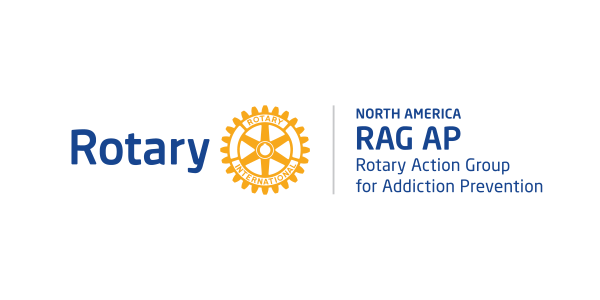March 1, 2023 Wilmington, NC The Rotary Action Group for Addiction Prevention (RAG AP) is pleased to announce a collaboration partnership with Project VBOT to provide Medication Assisted Treatment (MAT) services as part of the RAG-AP SMART Project. “VBOT’s approach is the most unique model I have seen in my 17 years of addiction treatment” says Arun Gupta, M.D., author of “The Preventable Epidemic” A frontline Doctor’s Experience and Recommendations to Resolve America’s Opioid Crisis, and Board Member of RAG AP. “Only 1% of providers care for 6% of patients with MAT/ MOUD. Patients in treatment do not die. Those who remain untreated have a very high mortality rate. To reduce overdose deaths we have to improve access to care with serious opioid solutions.”
The drug overdose epidemic continues to worsen in the United States. Families Against Fentanyl found that fentanyl poisoning is now the leading cause of death in adults 18-45 years old. According to the CDC, 107,375 people in the United States died of drug overdoses and drug poisonings in the 12-month period ending in January 2022. A staggering 67 percent of those deaths involved synthetic opioids like fentanyl. Fortunately, Opioid Use Disorder (OUD) is a treatable chronic and mental health condition and MAT solutions such as those provided by VBOT are the safest option for treating OUD and can deliver as much as 50% reduction in mortality for patients with OUD.
About the Addiction Prevention Project
Rotary is no stranger to taking on big health related challenges as they did in the 1970’s when they tackled getting the Polio vaccines in the arms of people around the world and specifically in underserved areas. Now they have turned their focus on helping those suffering opioid addiction find access to treatment through RAG AP. “We are excited to partner with Project VBOT to deliver the entire MAT program virtually including prescriptions, counseling, coaching, and lab all in one patient registry across the United States as they have successfully done in North Carolina.” says Larry Kenemore, North American Chapter Leader”.
Project VBOT (Virtual Based Opioid Treatment) was established in 2018 by the North Carolina Medical Society Foundation to offer Medication Assisted Treatment (MAT) to the rural underserved areas of North Carolina. By collaborating on the creation and development of a technology platform (www.therecoveryplatform.com) and building out a multidisciplinary virtual network of behavioral health specialists, VBOT has been successfully delivering high quality, patient compliant addiction treatment throughout the state. Understanding that the demand for treatment is similar in other regions of the country, VBOT is partnering with organizations including state medical societies, payers, and government leaders to expand nationally.
“We are very excited to partner with Rotary Action Group Addiction Prevention North America to provide the boots on the ground, along with critical relationships throughout the country to spread our innovative virtual MAT delivery model”, says Franklin Walker, VP NCMSF and founder of the VBOT initiative. “Our technology will allow those suffering addiction to maintain control over their treatment and privacy with features like self-scheduling and telemedicine,” adds The Recovery Platform CTO Reynold Yordy.
About North Carolina Medical Society Foundation
The North Carolina Medical Society Foundation (NCMSF) is the philanthropic arm of the North Carolina Medical Society. The mission of the North Carolina Medical Society Foundation is to improve access to quality health care for all North Carolinians. Our portfolio of programs demonstrates our commitment to this vision. In addition to Project VBOT, the Foundation has created programs including Our Community Health Initiative, a technology enabled service that supports Primary Care Providers wishing to offer their patients services such as Diabetes Prevention, Chronic Care Management, and Behavioral Health Integration.
About Rotary Action Group Addiction Prevention North America RAG AP
RAG AP is a group of Rotarians who have researched the opioid crisis and determined that the 1.4 million Rotarians who are neighbors, friends, leaders, and problem-solvers are best suited to address the opioid crisis in the local community. They have developed a Project that contains five (5) Programs necessary to solve this crisis one of which includes Treatment. We see a world where people unite and take action to create lasting change in communities across the globe. For more than 110 years, Rotary’s members of action use passion, energy, and intelligence to take action on sustainable projects.
About The Recovery Platform
The Recovery Platform (TRP) is a purpose-built platform, headquartered in Wilmington NC, that facilitates and guides physician workflow and patient engagement for Medication Assisted Treatment (MAT). By leveraging its concierge-like patient functionality, it expands access and privacy for treatment to rural and underserved areas of the country. TRP’s technology automates the monitoring and ingestion of patient data which is analyzed and reported to support more complete and timely clinical decisions. TRP features patient self-scheduling to increase patient engagement while embedded telemedicine functionality increases access and privacy, improving appointment attendance and retention.
To learn more about Project VBOT, visit www.projectvbot.com
Or contact: Gene Hicks,
Project VBOT
ghicks@projectvbot.com
Larry Kenemore North America Chapter Leader
larry@ragapnorthamerica.us
The Recovery Platform
Pete Gratale, CEO
pgratale@therecoveryplatform.com
